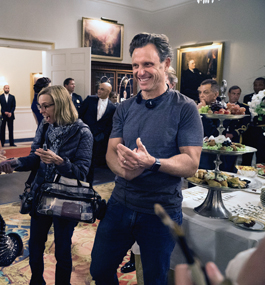The Brandeis Questionnaire
Tony Goldwyn ’82

ABC / Mitch Haaseth. © 2017 American Broadcasting Companies, Inc. All rights reserved.
Taking a break from directing on the “Scandal” set.
He’s going to do the opposite of what you expect. That’s the inside angle on Tony Goldwyn ’82, actor, director, activist and this year’s recipient of Brandeis’ Alumni Achievement Award.
When he was a kid, his Hollywood-royalty family (legendary movie mogul Samuel Goldwyn was his grandfather, film producer Samuel Jr. his dad) kept him far away from the bright lights. The last industry young Tony wanted to join was show business — until he tried out for a high-school play and realized immediately (surprise!) that acting was his thing.
Yet this SoCal boy’s apprenticeship to his craft truly began in Waltham, Massachusetts. Goldwyn credits Brandeis with developing his approach to acting, thanks to Ted Kazanoff, acting teacher and longtime head of the theater department. After college, Goldwyn headed off to drama school in London, then did stage work in New York.
Finally, the film and TV industry called. Goldwyn got his big break in the 1990 movie “Ghost.” His iconic turn as a sleazy Patrick Swayze-killing villain wasn’t erased from the public consciousness until 2012, when he took another iconic part, that of sexy U.S. president Fitzgerald Grant III in the TV series “Scandal,” which wrapped its seventh and final season this spring.
Along the way, Goldwyn mixed it up as an actor, playing Neil Armstrong (in the HBO miniseries “From the Earth to the Moon”) and Tarzan (in the eponymous animated Disney feature); roles in two off-Broadway plays by Theresa Rebeck, MA’83, MFA’86, PhD’89; and Captain von Trapp in a concert performance of “The Sound of Music” at Carnegie Hall. In the midst of a booming acting career, Goldwyn again took the less-expected path, directing four feature films, including “A Walk on the Moon.”
These days, Goldwyn is so recognizable that, as he told the audience at a Brandeis alumni event in Southern California a few years ago, he can’t go to Starbucks anymore. And he’s doing something with his visibility that (surprise!) you probably would expect of this Brandeisian who became a megastar. He’s a spokesperson for and supporter of the Innocence Project, Americares and other humanitarian causes.
Plus ça change.
What was your idea of perfect happiness when you were at Brandeis?
Being onstage.
Who was your favorite Brandeis professor?
Ted Kazanoff.
Where did you usually spend Saturday night?
If I wasn’t at the theater, I was usually having fun somewhere in Boston — the best place to go to college on the planet.
If you could be any other Brandeisian, who would it be?
Louis Brandeis!
What is the most important value you learned at Brandeis?
That intellectual rigor is a critical part of being an artist.
What was the most important shortcut you learned in college?
If you take good notes in class, you don’t have to study the whole syllabus for a test.
What do you wish you had studied harder?
Everything.
What three words of advice would you give to current Brandeis students?
Seven words: Listen to your gut before your head.
What would your friends say is your greatest strength?
Empathy.
What would your friends say is your greatest weakness?
I’m too nice.
What book do you read again and again?
“The Brothers Karamazov.”
What movie changed your life?
“Ghost.”
Which possession do you most like to look at?
The Buddha head I inherited from my mother.
Whom would you like to sing a duet with?
Barbra Streisand.
Which bad break was your biggest blessing?
Not getting cast in a TV pilot two months before I was cast in “Ghost.”
If you could climb into a time machine, whom would you like to hang out with?
Teddy Roosevelt.
On your deathbed, what will you be most grateful for?
My family.
